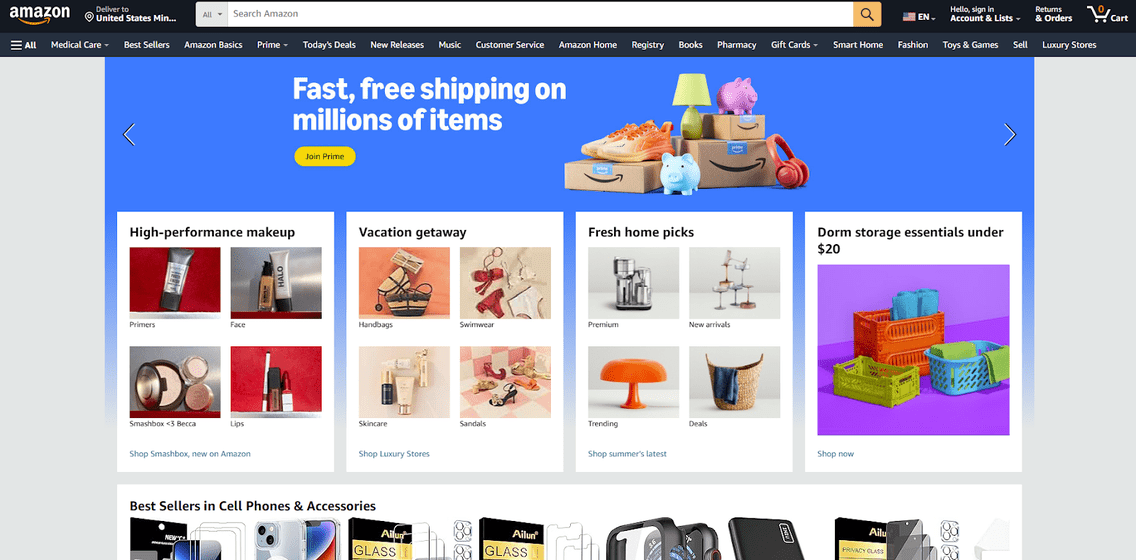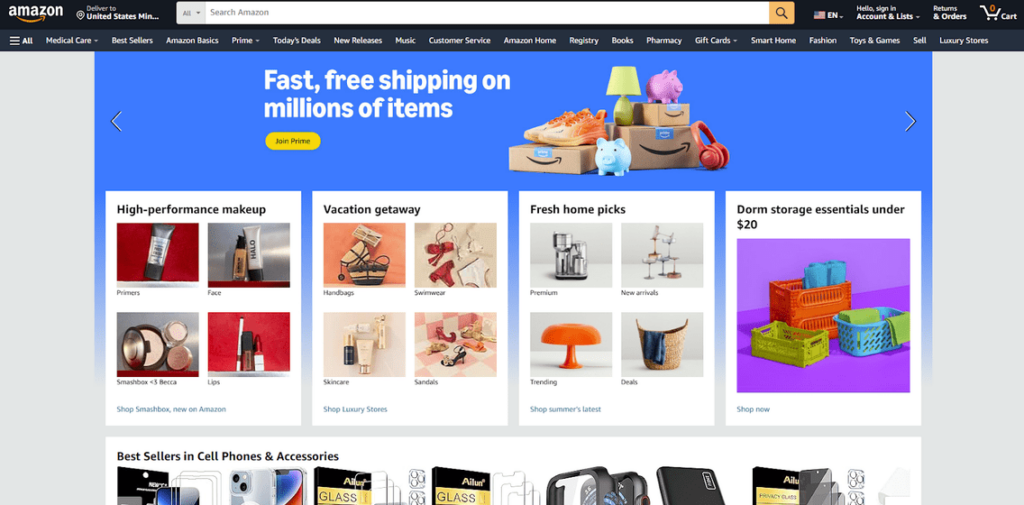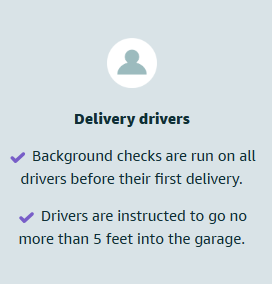Is Amazon Safe?
Laura Martisiute
Reading time: 11 minutes

Table of Contents
If you use or plan to use Amazon, you need to know: Is Amazon safe?
Below, we explain whether Amazon is:
- Safe to use.
- Good for privacy.
We also look at some steps you can take to improve both your safety and privacy when using this online service.
What Is Amazon?
Amazon is a multinational technology company that started as an online bookstore but has since evolved into one of the world’s largest e-commerce platforms.

Founded by Jeff Bezos in 1994, Amazon has expanded its services to include a wide range of products and services, including electronics, clothing, groceries, and digital content such as movies, music, and eBooks.
In addition to its retail operations, Amazon is also a major player in cloud computing through its subsidiary Amazon Web Services (AWS), which provides on-demand cloud computing platforms and APIs to individuals, companies, and governments. AWS is one of the most profitable segments of Amazon’s business, offering services like storage, databases, machine learning, and artificial intelligence.
Amazon’s influence extends into areas such as artificial intelligence, logistics, entertainment (through Amazon Prime Video and Amazon Studios), and even physical retail with its acquisition of Whole Foods Market.
The company is known for its customer-centric approach, with a focus on fast delivery, a vast selection of products, and competitive pricing.
Is Amazon Safe?
Yes, Amazon is generally considered a safe platform.
It uses encryption and secure servers to protect your personal and payment information and offers two-factor authentication (2FA). On its website, it provides information on how to identify a scam and report a scam.
However, while Amazon itself is reliable, some third-party sellers on the platform might not be. Issues can include counterfeit goods, misleading product descriptions, or poor customer service. Some products may have fake reviews that inflate their ratings.
The platform continuously monitors sellers based on metrics like shipping times, customer feedback, and order defect rates to ensure sellers meet high standards.
It prohibits the sale of certain unsafe or regulated items and has strict guidelines for categories like food, cosmetics, and electronics.
Programs like “Project Zero” and “Brand Registry” help brands protect their products from counterfeiters. For certain products, Amazon offers a “Transparency” code that allows customers to verify the item’s authenticity by scanning the code with their phone.
To help resolve disputes with third-party sellers, including issues with the condition of an item or delivery problems, Amazon offers the A-to-z Guarantee, a protection program designed to ensure that customers are satisfied with items they purchase from third-party sellers on Amazon’s marketplace.
Amazon devices, like Fire tablets and Echo devices, have built-in parental controls to limit access to age-appropriate content and manage screen time.
Amazon Alexa includes safety features like the ability to turn off voice purchases. Users can also manage who can communicate with Alexa devices in their household.
The security company UpGuard gives Amazon a score of 830 out of 950.
Among the issues noted are the following:
- HTTP Strict Transport Security is not enforced.
- Insecure encryption protocols are supported.
- No valid Content Security Policy is implemented.
- The domain lacks a valid Certification Authority Authorization record.
Over the years, Amazon has experienced several security-related incidents. For example, in 2018, a technical issue resulted in the company accidentally posting customer names and email addresses on its website.
Is it safe to order from Amazon?
Yes, ordering from Amazon is generally considered safe.
Amazon is one of the world’s largest and most established e-commerce platforms. They have robust security measures for payments and data protection and offer options like gift cards, which add an extra layer of security if you’re concerned about using your credit card.
The platform offers buyer protections, including refund and return policies. If something goes wrong, you can usually request a refund or replacement, especially if the item is fulfilled by Amazon.
However, because many products on Amazon are sold by third-party sellers, it’s essential to check the seller’s ratings, reviews, and feedback before making a purchase.
Some products, especially luxury items, electronics, and popular brands, may be counterfeited. Stick to well-rated sellers or those labeled as “Amazon Verified” or “Amazon’s Choice” when buying high-value goods.
Be cautious of phishing attempts through fake emails or websites mimicking Amazon. Always double-check the URL and communication.
Is food from Amazon safe?
Food from Amazon can be safe, particularly from their direct services like Amazon Fresh, Whole Foods, and Amazon Pantry. Shelf-stable items like canned goods, snacks, and non-perishables are generally preferred when ordering from Amazon.
Be cautious when buying food from third-party sellers. Always check the seller’s reputation, reviews, and ratings. Some third-party sellers might not follow proper storage or handling practices, which could lead to compromised food safety.
As one Redditor points out, “Avoid the alphabet soup companies (e.g., XYLSODHD and LOSJESR) because those are here-today-gone-tomorrow scammish companies.”

For perishable items like meat, dairy, or produce, make sure the delivery method is appropriate. Amazon typically delivers these items in temperature-controlled packaging. If the packaging is damaged or the food feels warm when it shouldn’t, it’s best to contact Amazon for a refund or replacement.
Is Amazon delivery safe?
Yes, Amazon delivery is generally considered safe.
The company follows strict guidelines to prevent package tampering and ensure food safety and hygiene.
To reduce the likelihood of package theft, Amazon offers delivery options like “Amazon Key” and lockers for secure package storage. With Amazon Key, delivery drivers can leave packages inside your home or garage, reducing the risk of theft. Lockers are available at various locations, allowing you to pick up packages securely at your convenience.
If your package is lost, damaged, or stolen, Amazon’s A-to-Z Guarantee provides protection. This covers issues like damaged goods, expired food, or non-delivery and usually offers quick refunds or replacements.
Is Amazon Key safe?
Depends on your definition of “safe.”
Amazon Key is a service that allows delivery drivers to leave packages inside your home, garage, or car using a smart lock and camera system. It’s mainly designed to prevent porch piracy and ensure packages are securely delivered even when you’re not home.
The service uses a smart lock paired with a security camera (like the Amazon Cloud Cam or compatible devices) to allow you to monitor deliveries in real time. The camera records the delivery, letting you see who enters your home and what they do.
Delivery drivers are given one-time access codes that expire immediately after the delivery. This minimizes the risk of unauthorized access.
Only Amazon-approved delivery drivers can access the system. Amazon claims these drivers undergo background checks and are trained specifically for in-home deliveries.

Overall, online users seem to have had generally positive experiences with Amazon Key.
However, even with security measures, some people might feel uneasy about granting anyone access to their home.
You can read a full review of someone using Amazon Key on Tom’s Guide.
Is Amazon Private?
Depends on your definition of “private.”
Amazon collects a wide range of data, including your personal information (like name, address, and payment details), browsing and purchase history, search queries, and even voice data through devices like Alexa.
This data is used to personalize your shopping experience, recommend products, and target advertisements. Amazon also uses it to improve its services and develop new products.
Many internet users feel that Amazon tracks too much information.
Amazon shares data within its ecosystem, including subsidiaries like Whole Foods and Amazon Web Services (AWS). This helps Amazon create a seamless experience across its services.
Amazon may share data with third-party sellers, advertisers, and service providers for purposes such as fulfilling orders, delivering content, and targeting ads.
Amazon claims that it does not sell personal information to third parties.

Some notable privacy incidents involving Amazon include (but are not limited to) the following:
- Amazon employees leaked customer data (including their email addresses) to an unaffiliated third party. Amazon terminated the employees.
- There were multiple reports where Amazon’s Alexa recorded and sent private conversations without user consent. In one case, a Portland family reported that their Echo device sent a private conversation to one of their contacts without their knowledge. Amazon cited it as a misunderstanding, but it raised alarms about voice assistant privacy and accidental activations.
- Amazon’s subsidiary Ring, which provides home security cameras, faced multiple privacy and security scandals. In one instance, a former Ring employee spied on female customers through cameras placed in bedrooms and bathrooms.
Amazon provides options for users to manage some privacy settings. For example, you can review and delete voice recordings from Alexa, manage your browsing history, and adjust ad preferences.
Amazon’s privacy policy outlines its data collection and sharing practices, but the sheer amount of data collected can be overwhelming for users to fully understand.
Terms of Service; Didn’t Read (ToS;DR), a project that rates internet services’ terms of service and privacy policies, gives Amazon a “Grade E.” This means, “The terms of service raise very serious concerns.”
ToS;DR notes that Amazon:
- Tracks you on other websites.
- Allows third-party advertisers to set cookies.
- Can change its terms at any time and without notification to users.
- Can delete user accounts without notice or reason.
- Collects and shares voice data with third parties.
- Uses your personal data for advertising.
As positives, ToS;DR says that Amazon provides details about what kind of information they collect and allows users to opt out of promotional communications.
How to Improve Your Safety and Privacy On Amazon
Follow the steps below for a more private and secure experience while using Amazon.
- Turn off browsing history. Amazon tracks your browsing activity to personalize recommendations. You can manage or turn off your browsing history by going to Account & Lists > Your Account > Browsing History > Manage history and turning off “Browsing History.”
- Review and delete Alexa recordings. If you use Alexa devices, you can review and delete voice recordings. Go to Alexa Privacy Settings in the Alexa app or on Amazon’s website, where you can choose to delete recordings automatically every 3 or 18 months or delete them manually.
- Manage ad preferences. Amazon uses your data for targeted advertising. To limit this, go to Account & Lists > Your Account > Advertising Preferences and opt out of personalized ads.
- Enable two-factor authentication (2FA). This adds an extra layer of security to your account, making it harder for unauthorized users to access your account. You can enable 2FA in Account & Lists > Your Account > Login & Security.
- Limit app permissions. If you use the Amazon app, check its permissions on your device. For example, you should restrict access to your location, contacts, or camera if those features aren’t necessary for your app use.
- Be cautious with Alexa and other smart devices. If you have Alexa-enabled devices, turn off voice purchasing to prevent accidental or unauthorized orders. This can be done in the Alexa app under Settings > Account Settings > Voice Purchasing. When you’re not using your Alexa device, consider muting the microphone. This prevents Alexa from listening for the wake word and potentially recording unintended conversations.
- Avoid using smart devices for sensitive tasks. Consider not using Amazon smart devices like Alexa for sensitive tasks, as these devices are always listening and could potentially capture private information.
- Review and limit third-party data sharing. When making purchases, be cautious about the information you provide to third-party sellers. Amazon’s privacy settings allow you to control what information is shared with these sellers, particularly your email address.
- Use a separate email for Amazon. Use a dedicated email address just for Amazon-related activities to limit tracking and data aggregation across different services.
- Use a pseudonym for reviews. If you frequently leave reviews on Amazon, consider using a pseudonym to avoid having your real name publicly associated with your reviews.
- Limit profile visibility. Your Amazon profile shows your public activity, like wish lists and reviews. You can manage what others see by going to Account & Lists > Your Account > Profile and adjusting your privacy settings.
- Use privacy-focused tools. Consider using privacy-focused browser extensions to prevent Amazon from tracking you across the web.
- Use gift cards for purchases. Consider using Amazon gift cards instead of credit or debit cards to anonymize your purchases. This reduces the amount of personal financial information Amazon has on file.
Our privacy advisors:
- Continuously find and remove your sensitive data online
- Stop companies from selling your data – all year long
- Have removed 35M+ records
of personal data from the web
Save 10% on any individual and
family privacy plan
with code: BLOG10
news?
Don’t have the time?
DeleteMe is our premium privacy service that removes you from more than 750 data brokers like Whitepages, Spokeo, BeenVerified, plus many more.
Save 10% on DeleteMe when you use the code BLOG10.

















